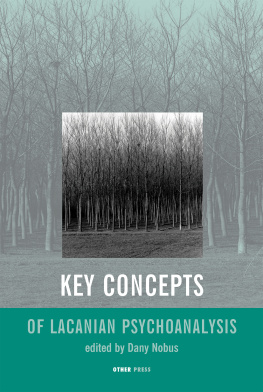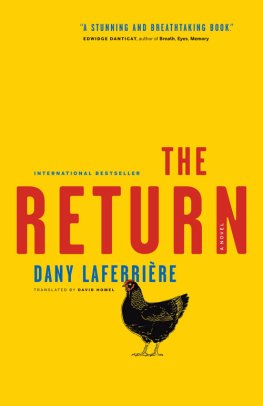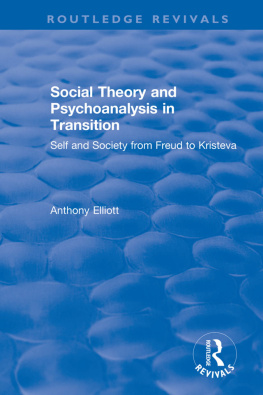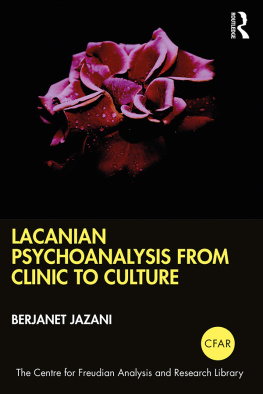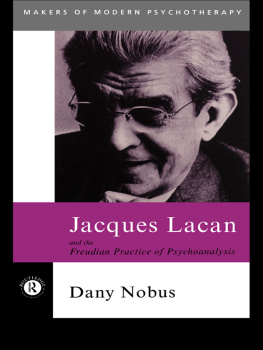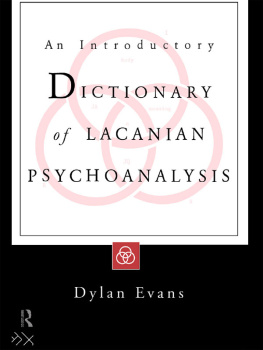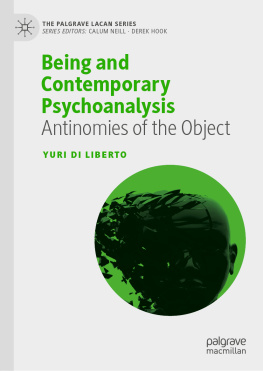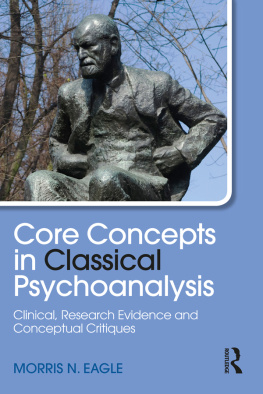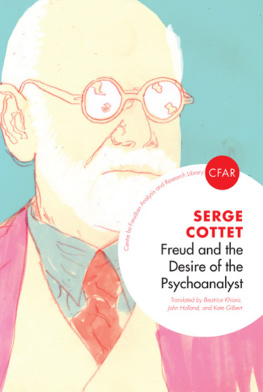Dany Nobus - Key Concepts of Lacanian Psychoanalysis
Here you can read online Dany Nobus - Key Concepts of Lacanian Psychoanalysis full text of the book (entire story) in english for free. Download pdf and epub, get meaning, cover and reviews about this ebook. year: 2020, publisher: Other Press, genre: Romance novel. Description of the work, (preface) as well as reviews are available. Best literature library LitArk.com created for fans of good reading and offers a wide selection of genres:
Romance novel
Science fiction
Adventure
Detective
Science
History
Home and family
Prose
Art
Politics
Computer
Non-fiction
Religion
Business
Children
Humor
Choose a favorite category and find really read worthwhile books. Enjoy immersion in the world of imagination, feel the emotions of the characters or learn something new for yourself, make an fascinating discovery.
- Book:Key Concepts of Lacanian Psychoanalysis
- Author:
- Publisher:Other Press
- Genre:
- Year:2020
- Rating:5 / 5
- Favourites:Add to favourites
- Your mark:
- 100
- 1
- 2
- 3
- 4
- 5
Key Concepts of Lacanian Psychoanalysis: summary, description and annotation
We offer to read an annotation, description, summary or preface (depends on what the author of the book "Key Concepts of Lacanian Psychoanalysis" wrote himself). If you haven't found the necessary information about the book — write in the comments, we will try to find it.
Key Concepts of Lacanian Psychoanalysis — read online for free the complete book (whole text) full work
Below is the text of the book, divided by pages. System saving the place of the last page read, allows you to conveniently read the book "Key Concepts of Lacanian Psychoanalysis" online for free, without having to search again every time where you left off. Put a bookmark, and you can go to the page where you finished reading at any time.
Font size:
Interval:
Bookmark:
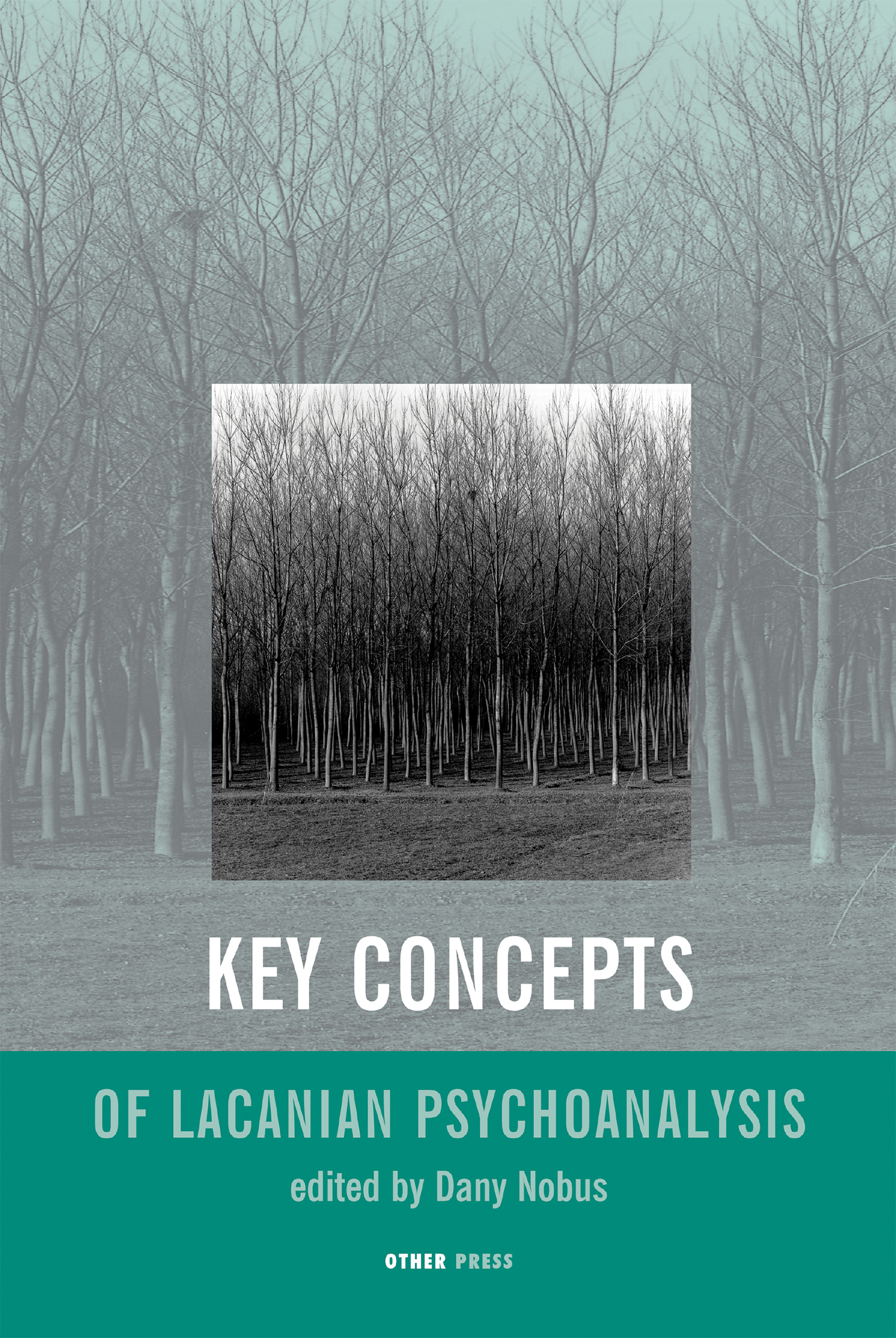
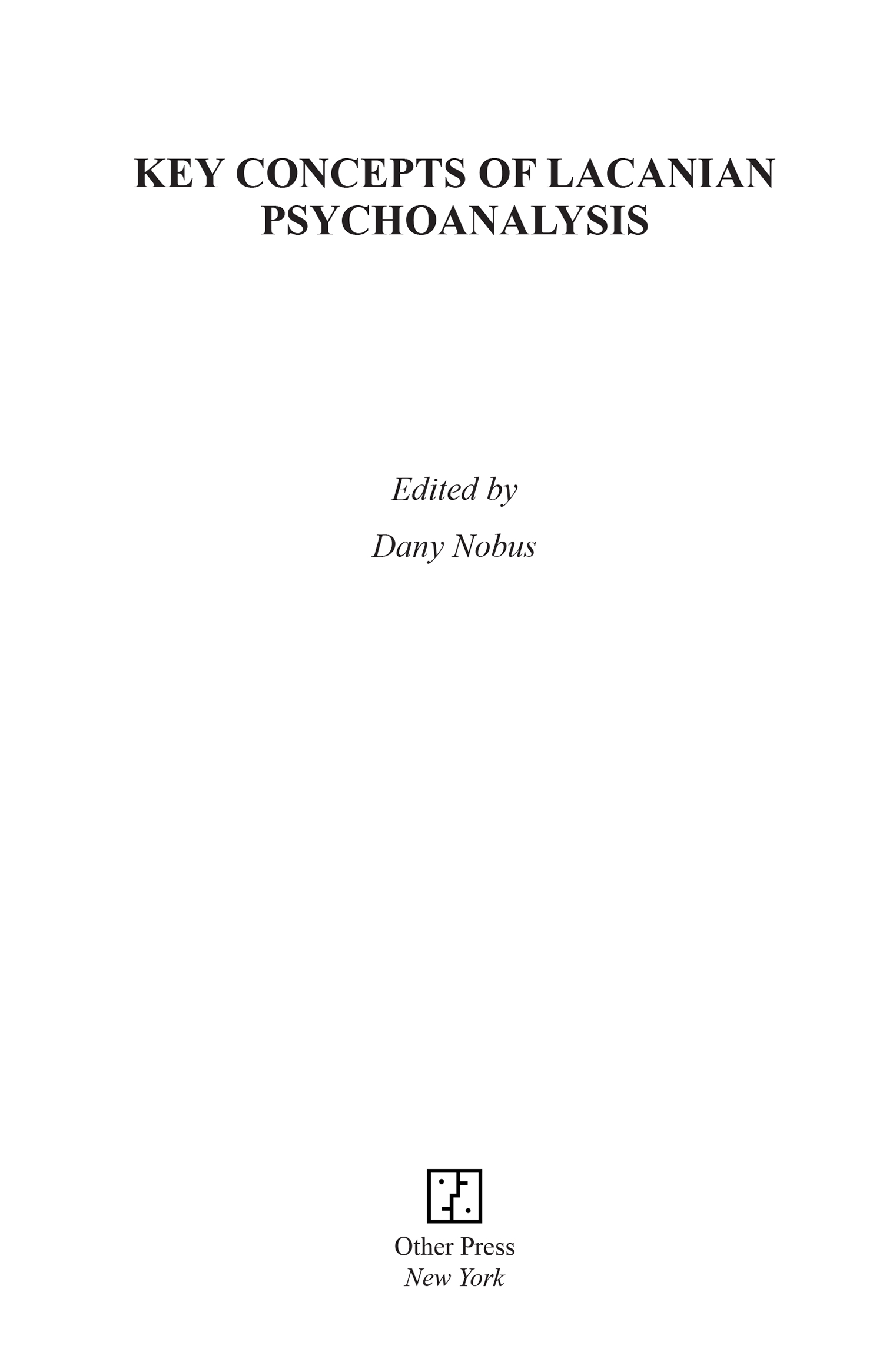
1999 printing
Copyright 1998 by Dany Nobus. To the edited collection and the individual authors to their contributions 1998.
Ebook ISBN9781635421132
All rights reserved, including the right to reproduce this book, or parts thereof, in any form, without written permission from Other Press, LLC except in the case of brief quotations in reviews for inclusion in a magazine, newspaper, or broadcast. For information write to Other Press, LLC, 267 Fifth Avenue, 6th Floor. New York, NY 10016. Or visit our Web site: www.otherpress.com.
The Library of Congress has cataloged the printed edition as follows:
Key concepts of Lacanian psychoanalysis / edited by Dany Nobus.
p. cm.
Includes bibliographical references and index.
ISBN-1-89276-14-X (pbk. : alk. paper)
1. Psychoanalysis. 2. Lacan, Jacques, 1901 I. Nobus, Dany.
BF173.K425 1999
150.195dc21 99-17394
Bruce Fink, The Master Signifier and the Four Discourses. Parts of this chapter appeared in The Lacanian Subject: Between Language and Jouissance, copyright 1995 by Princeton University Press, 3rd printing and 1st paperback printing 1997, and A Clinical Introduction to Lacanian Psychoanalysis: Theory and Technique, copyright 1997 by Harvard University Press, 1st printing 1997.
a_prh_5.6.0_c0_r0
The idea for this book grew out of a discussion I had with Irish colleagues during one cold November night in Dublin, some two years ago. We were celebrating the success of the 2nd Annual Congress of the Association for Psychoanalysis and Psychotherapy in Ireland and, between mouthfuls of Guinness, expressing our dissatisfaction with the existing introductions to Lacanian thought. At one point, somebody conceded that the information provided by these introductory works is never enough and always too much, a principle which somebody else had used previously to characterize the dynamics of addiction. Although it was obvious to all of us that the comparison had been triggered by the context, it struck me as quite accurate, and I started to wonder whether it would be possible to produce an introductory work on Lacan according to different criteria, which set me on the tracks leading to this book.
Apart from all those people present at my table on that memorable Irish night, I wish to express my gratitude to all the authors who have agreed to contribute to this volume for complying with the guidelines I set out for them and for patiently tolerating my repeated requests for revision. I would also like to thank Chris Lillja and Jamie Orr at Princeton University Press, and Jeffrey Czekaj at Harvard University Press for granting permission to reprint the sections in Bruce Finks paper which appeared previously in The Lacanian Subject and A Clinical Introduction to Lacanian Psychoanalysis. Finally I thank Oliver Rathbone and Kirsty Hall at Rebus Press for supporting this project from its earliest stages and for providing invaluable editorial advice.
Since the 1980s, Lacanian ideas have stealthily yet steadily penetrated the social sciences, the arts and the humanities. The works of Lacan are currently a standard reference within cultural, gender and womens studies, and they also inspire many authors working within the realms of philosophy and political theory. At the same time, Lacanian ideas continue to spark off heated debates amongst psychoanalysts and lay-people alike. whereby Lacans numerous personal idiosyncrasies are often used as arguments ad hominem to minimize the value of his theoretical contributions.
Confronted with this broad dissemination of Lacanian thought and the multifarious controversies surrounding it, professional researchers, health care workers and students often try to find solace in psychoanalytic works of reference. Over the past decade, many works have been published in which psychoanalytic concepts, schemas, and symbols are defined in a brief, accessible format, although mainly in French and dealing with psychoanalysis in general rather than Lacanian theory as such.
Considering the scope and the quality of these materials, the primary Lacan-needs of the Anglo-American reader are already well catered for, which reduces the desirability of yet another introduction to Lacan. In conceiving Key Concepts of Lacanian Psychoanalysis I have tried to ensure that the book is neither an alternative, nor a complement to the existing works of reference. In the essays that follow, the newcomer to Lacanian psychoanalysis will not find any short definitions of terms, nor any concise expositions of what concepts and symbols mean within the various contexts in which they have appeared. Rather than a ready reference, each author provides an in-depth discussion of one particular notion, paying attention to the theoretical and/or practical context in which Lacan introduced it, the way in which the notion developed throughout his works, the questions it was designed to answer, and its relevance for clinical and/or sociocultural issues. Contrary to a readers companion, Key Concepts of Lacanian Psychoanalysis probes into the sources, dimensions and purposes of as few as eight Lacanian concepts, exploring how they relate to other Lacanian and non-Lacanian notions, and questioning their value for present-day clinical and non-clinical issues. In this sense, the book is not an alternative to the available compendia and introductions. Yet Key Concepts of Lacanian Psychoanalysis is neither a complement to these books, since it does not focus on Lacans general sociocultural legacy, nor strictly speaking on his life and works.
One might therefore assume that these essays are addressed to professional psychoanalysts, advanced Lacan-scholars and highbrow academics. Nothing could be less true. Key Concepts of Lacanian Psychoanalysis does not presuppose any familiarity with Lacanian theory on the part of the reader, nor a prior acquaintance with Lacans crits or seminars. Although all the essays proceed from a close reading of Lacans writings and lectures, they invite the reader to start his or her own reading rather than consolidating and building on an already accomplished groundwork. To facilitate the readers personal return to Lacan, each essay contains detailed and extensive references to primary and secondary source materials, as well as suggestions for further reading.
As the reader will notice, some of the primary sources are still unpublished and many of those which have already been published are not yet available in English. For the purposes of this book, the inclusion of these materials was necessary, since it is for example impossible to discuss the development of a concept throughout Lacans works without taking into account his unpublished seminars (some eighteen volumes) and those already published yet hitherto not officially translated into English (four volumes).
ln this sense, Lacans ideas from the 1970s display a higher degree of complexity than those from the 1950s, without the latter completely disappearing under the influence of the former. The early Lacan is often recognizable behind the faces of the middle and late Lacan. This does not mean that Lacans entire theory is always already there, contained in utero in his earliest contributions, since such an interpretation does not acknowledge the fact that when early concepts surface in a later context, they always acquire new meaning. But it neither implies that his is a theory of ongoing progress. A cursory reading of his texts and seminars from the 1970s suffices to recognize that his later developments are not a synthesis of the early ones. Lacan does not work towards the realization of absolute psychoanalytic knowledge, but rather towards a destabilization of knowledge whether somebody elses or his own that gives the impression of being firmly established. Lacans incessant challenge of ready-made psychoanalytic knowledge might also explain why there is currently no solid, unitary Lacanian Theory, and why such a Theory is unlikely to emerge from a close reading of his works.
Font size:
Interval:
Bookmark:
Similar books «Key Concepts of Lacanian Psychoanalysis»
Look at similar books to Key Concepts of Lacanian Psychoanalysis. We have selected literature similar in name and meaning in the hope of providing readers with more options to find new, interesting, not yet read works.
Discussion, reviews of the book Key Concepts of Lacanian Psychoanalysis and just readers' own opinions. Leave your comments, write what you think about the work, its meaning or the main characters. Specify what exactly you liked and what you didn't like, and why you think so.

